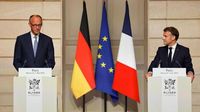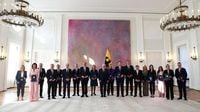On Tuesday, May 6, 2025, Friedrich Merz of the Christian Democratic Union (CDU) was elected as the tenth Chancellor of the Federal Republic of Germany, marking a significant shift in the nation’s political landscape. Merz took his oath of office with the phrase "So wahr mir Gott helfe" (So help me God), a notable choice as his predecessors, Olaf Scholz and Gerhard Schröder, both from the Social Democratic Party (SPD), had opted to omit any reference to God in their oaths.
In a ceremony held at the Bundestag, Merz faced a challenging start, failing to secure a majority in the first ballot. It was not until the second round that he received 325 votes, surpassing the required 316 votes for election. Following his successful election, the new ministers were sworn in, completing the formation of a coalition government comprised of CDU, the Christian Social Union (CSU), and SPD.
Thirteen of the newly appointed ministers, including Vice Chancellor and Finance Minister Lars Klingbeil (SPD), chose to affirm their oaths with a reference to God. Among them were ministers from the CDU such as Thorsten Frei, Johann Wadephul, Nina Warken, Katherina Reiche, Karin Prien, Karsten Wildberger, and Patrick Schnieder, as well as CSU members Alexander Dobrindt, Dorothee Bär, and Alois Rainer. The SPD was represented by Justice Minister Stefanie Hubig and Building Minister Verena Hubertz, both of whom also included the God reference in their oaths.
The swearing-in ceremony was presided over by Federal President Frank-Walter Steinmeier at Bellevue Palace, where he presented the ministers with their certificates of appointment. Steinmeier emphasized the significant responsibilities that the new government members are assuming, stating, "You jointly assume great responsibility for our country." He urged the government to swiftly demonstrate its capability to act, assuring citizens that the democratic state is competent and able to tackle pressing issues.
In his remarks, Steinmeier also addressed the earlier setback Merz experienced during the first ballot, noting, "Dear Mr. Chancellor, in democracy, some days unfold with more excitement than the public anticipates." He congratulated Merz again, albeit with a slight delay, and highlighted the importance of united efforts as the new federal government embarks on its journey in these challenging times.
The political landscape in Germany is currently fraught with challenges. Irme Stetter-Karp, President of the Central Committee of German Catholics (ZdK), expressed hope for a collaborative effort towards building a democratic and just society amid these difficulties. She pointed out the pressing issues, including the ongoing war in Ukraine and the crisis in the Middle East, which threaten the stability of both Europe and global peace. Furthermore, she noted that climate change poses significant challenges that must be addressed collaboratively to foster societal cohesion.
Meanwhile, Kirsten Fehrs, the Chair of the Council of the Evangelical Church in Germany (EKD), extended her wishes for Merz to possess confidence in God, perseverance, and patience as he navigates the complexities of governance. She remarked, "I wish Friedrich Merz to feel that God has not given us a spirit of fear, but of power, love, and self-discipline," a sentiment that resonates deeply during turbulent political times.
As the new government assumes office, the ministers are expected to act decisively in addressing various economic, social, and geopolitical challenges. Steinmeier articulated the necessity for new economic growth, renewed trust in democracy, and enhanced diplomatic efforts as the government prepares to tackle these multifaceted issues head-on.
The transition of power was further marked by the handover of the Federal Chancellery from former Chancellor Olaf Scholz to Friedrich Merz, a momentous occasion that symbolizes a new chapter in German politics. The previous ministers concurrently received their successors in their respective ministries, ensuring a seamless transition of responsibilities.
The CDU, CSU, and SPD coalition faces a myriad of expectations as they embark on this new journey. The government is tasked with restoring faith in democratic processes and addressing the pressing concerns of the populace. The challenges ahead are significant, and the success of Merz’s administration will largely depend on its ability to unite diverse political factions and respond effectively to the needs of the German people.
In summary, Friedrich Merz’s election as Chancellor brings forth a wave of hope and expectation amid a backdrop of political and social challenges. With the support of the newly sworn-in ministers, he is poised to lead Germany through a critical period, aiming to foster unity and resilience in the face of adversity.





